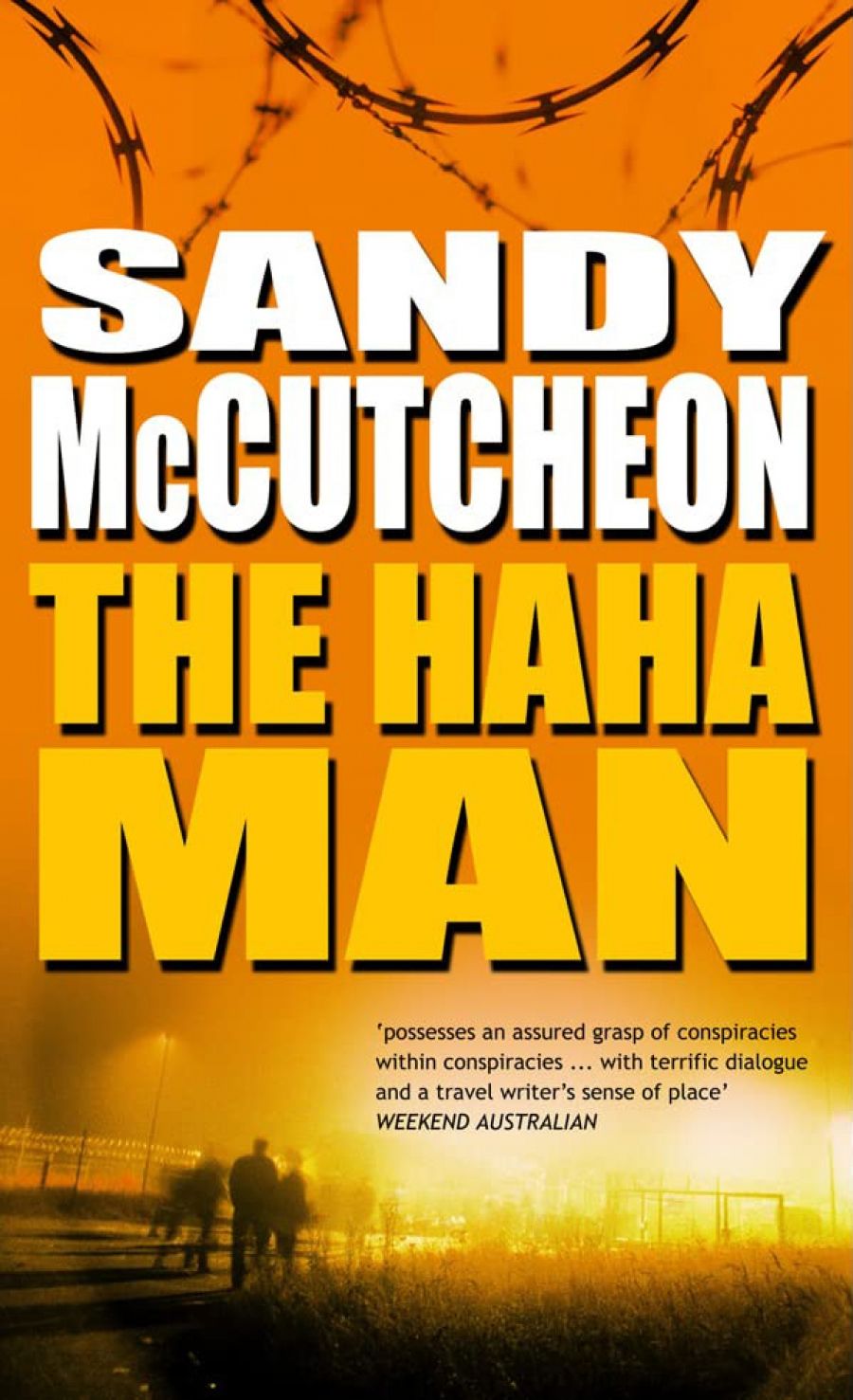
- Free Article: No
- Contents Category: Fiction
- Review Article: Yes
- Online Only: No
- Custom Highlight Text:
It’s not racism that makes my mother – once a poor girl from the Welsh valleys – side with the Howard government on the refugee issue: it’s an instinctive territorial defensiveness that can be easily exploited by emotive phrases: illegals, queue jumpers, people smugglers. She’s not alone, if her friends, other relatively prosperous, tax-paying senior Australian citizens, are anything to go by; but it’s not a hardline position. All it might take to soften their attitude is a copy of The Haha Man by Sandy McCutcheon, a rollicking good read that highlights the refugee plight without a whiff of the lecture hall.
- Book 1 Title: The Haha Man
- Book 1 Biblio: HarperCollins, $29.95 pb, 406 pp
- Book 1 Readings Link: booktopia.kh4ffx.net/oYKmE
The rule of thumb for both these books, indeed for all of their ilk, is to persuade readers that asylum seekers are just like ‘us’: that is, vulnerable human beings of some affluence. It is perhaps easier to identify with people who have a lot to lose, just like so many Australians; neither author tackles the altogether thornier path of economic poverty as a motivating force for exile. Keneally set his novel in Iraq, but gave his characters English names to push his point. McCutcheon uses Afghanistan, and relies on the notorious violence of the Taliban to ram his theme home.
On 8 August 1998, Ahmed Mazari and his son, Karim, are caught in the marketplace when their city, Mazari Sharif, is overrun by the Taliban. The subsequent relentless butchery of their Hazara ethnic group reminds us that one positive aspect of the so-called war on terrorism was the fall of the Taliban. Father and son are separated, and each presumes the other dead; after more than a year of living on the run, mourning the loss of his family, Karim is lucky to end up in a Pakistan refugee camp, from where he is able to reach his wealthy uncle in Peshawar. For a reason I won’t divulge, Karim decides to go to Australia and is helped in this tricky endeavour by a number of people, not least a group of Australian activists.
McCutcheon is careful not to castigate the Australian public – the emphasis here is on the government’s clever manipulation of notions of decency: ergo, the people who come here by boat are not desperate, but queue jumpers who will do anything to achieve their ends – and Karim, once safely ensconced in Glebe, is surprised by the friendliness of the man on the street. Such a man is embodied in the journalist Fossey, the other main protagonist in this novel. He is an essentially honourable human being who is inclined to go along with the government’s stance on refugees, and so is persuaded to become a spin doctor for his old school chum, the minister for immigration. This task eventually sickens him and sours his relationship with his wife, an Afghan exile brought up in the US.
On the couple’s return to Brisbane from Canberra, Fossey joins the other side and becomes the Haha man: the link between those seeking refuge and those willing to help them. A haha is an old English dry moat which, instead of an ugly fence, was used to protect aristocratic gardens from livestock – it’s an apt name tag, and a nice flourish in this cannily constructed novel. As with any good thriller writer, McCutcheon keeps a number of subplots rolling, all of which eventually interconnect. A terrorist organisation, modelled perhaps on al Qaeda, sets about unleashing a deadly virus in Australia, a reprisal for the country’s close involvement with the US, and a warning to other nations. It is terrifyingly easy for the two Saudi Arabians to establish a fragrant aerosol business: indeed, the minister for immigration fast-tracks their visas. In the meantime, a group of sassy women, masterminded by the enigmatic Rabia, plan a daring break-out of detainees from Woomera, and the tension mounts as they set off on what seems to be an impossible mission.
McCutcheon pokes fun at ASIO and has no qualms about caricaturing Canberra’s bureaucrats or the people who run the detention camps: from the minister down, they are oily, pompous, ruthless and venal, and, in the case of the camp guards, murderous. Stereotypes abound – even Walter the dog is a parody. It’s all hugely enjoyable, made doubly so because of The Haha Man’s quite profound moral theme. My mother shall be reading it soon.


Comments powered by CComment